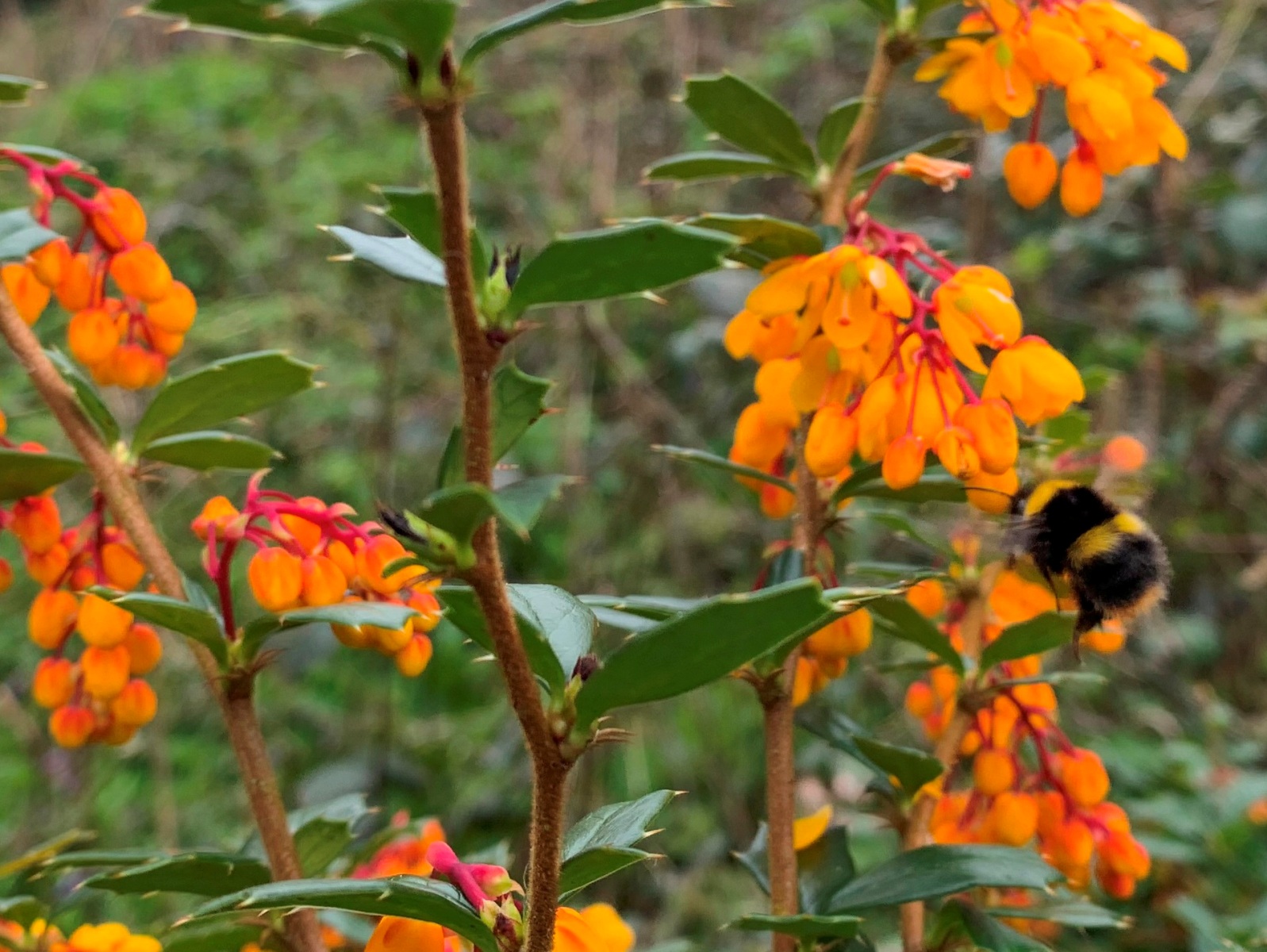Berberis darwinii
Berberis
Species Tolerances
- Drought Tolerance: Medium
- Shade Tolerance: Yes
- Waterlogging Tolerance: Low
- Frost Tolerance (trees from warmer climates may be frost tolerant, but their flowers may not be): Yes
- RHS Hardiness: H5
- Optimum Conditions for Growth:
A small evergreen tree or shrub which grows anywhere and tolerates any soil (except constantly waterlogged), enjoying full sun or partial shade. No strong dependence on acid or alkaline soil pH. - Susceptibility to Pest/Disease:
No major pest or diseases at present. Another species in the same genus, B. vulgaris, is susceptible to wheat stem rust, but B. darwinii has never been susceptible to date.

Berberis darwinii/ Bee Happy Plants & Seeds
Service to Pollinators
- Summary of Service to Pollinators:
Very floriferous and a good source of nectar and pollen for a wide range of bees. - Nectar Value to Pollinators: 3 (of 0-3)
- Honeydew Value to Pollinators: 0 (of 0-3)
- Pollen Value to Bees: 3 (of 0-3)
- Flowering Period: May
Risks
- Human Toxicity: Non-toxic
- Livestock Toxicity: Non-toxic
- Invasive Risk: No
- Suckering: No
Products
- Edible Fruit: Yes
- Edible Leaves: No
- Edible Sap: No
- Edible Seeds: Yes
- Honey, major source in UK: Yes
- For any medicinal potential, see 'Further Details' below.
- Timber: Yes
- Livestock Fodder: Yes
- Other Products:
Edible berries fresh and dried are a delicacy in other cooking cultures, with potential here for health benefits too. Seeds also edible.
Utility
- Nitrogen Fixation: No
- Organic Matter Accumulation: Insufficient Data
- Phytoremediation: Insufficient Data
- Deacidification: Insufficient Data
- Windbreak: Yes
- Soil Erosion Control: Insufficient Data
- Shade or Shelter: No
- Plant Support: Insufficient Data
- Integrated Pest Management: Insufficient Data
- Wildlife Value: Yes
- Wildlife Value Summary:
Provides berries for a large number of birds and mammals - Graduated Nativeness Classification ⓘ: 9 (of 1-10)1. Historic Native
2. Historic Introduction
9. Neutral Introduction
Further Details
Thorns provide protection. Timber hard, heavy and fine. *“Of the 18 barberry species previously recorded as cultivated in South Africa (Glen, 2002), (only) Berberis holstii and B. vulgaris are known to be susceptible to stem rust, or black rust, the fungal pathogen Puccinia graminis” (Berberis darwinii and other species in the genus were noted as not succumbing to these rusts, and not likely to become invasive owing to its young shoots and leaves being palatable to wildlife). (*The Invasion Potential of Selected Berberis Species in South Africa Jan-Hendrik Keet Botany in the Faculty of Natural and Agricultural Sciences, University of the Free State, Bloemfontein. Supervisors: Prof. P. J. du Preez Dr. B. Visser Ms. D. Cindi January 2015)
Berberine, universally present in all parts of Berberis species but especially the rhizomes, has marked antibacterial effects and has also shown anti-tumour activity.